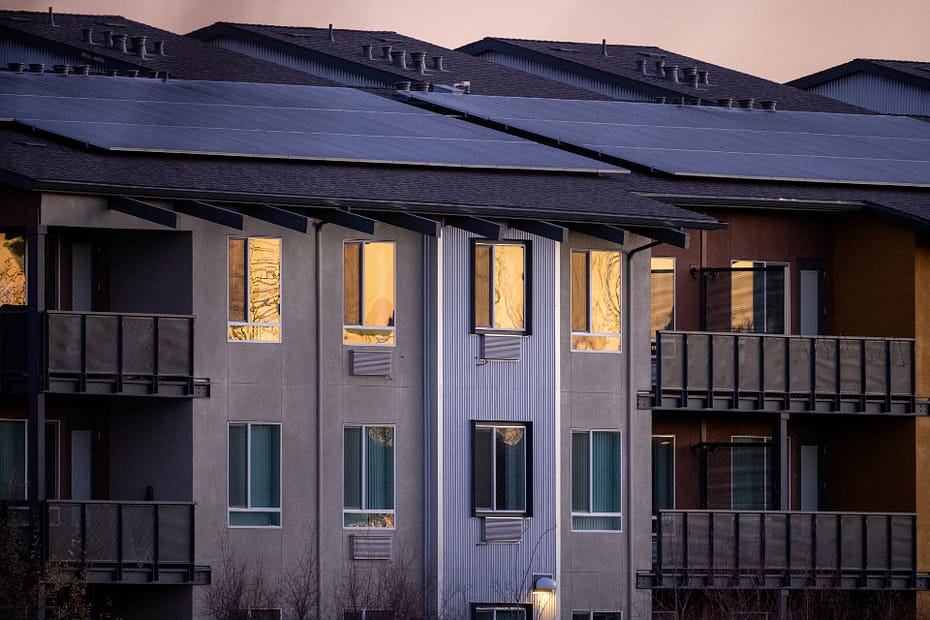Add value, save money, and lessen your home’s carbon footprint with solar panels.
Idealists’ and realists’ homes might benefit from solar energy systems. But what does it actually entail?
Homeowners who install solar panels may be able to reduce their monthly energy costs. You save a ton of money on your electricity bill each month by using the sun to power your home.
As the sun’s rays strike a solar panel, the photovoltaic cells in that panel absorb their energy. This energy produces moving electrical charges in reaction to an electrical field inside the cell, which causes electricity to flow.
Solar panels can be installed on rooftops, floors, or walls. Typically, solar tile systems cost twice as much as solar panel systems. When the solar panels are installed, an inverter transforms the DC electricity produced by the panels into AC, which is used by the majority of household equipment.
Commercial solar installations are substantially larger and have a greater environmental and economic impact than comparable household systems, which typically range between 5 and 10 kilowatts.
Solar panels can help you save money over time, despite their high initial investment cost. Because they save money on energy costs and have less of an impact on the environment, solar panels can raise a home’s value and make it more appealing to purchasers.
As we proceed through this book, we’ll go into more detail on the value of your home, the elements that determine its final selling price, and the effect on your property taxes. Additionally, we will talk about the solar tax credits and incentives that may enable you to make even bigger financial savings.
Solar energy, which can be converted into heat or electricity, comes from the sun’s rays. Technology advancements have made it possible for humans to utilize even more of the free energy provided by the sun.
Environmentally friendly
The annual carbon emissions of a family can be decreased by installing solar panels. Because they convert sunlight into energy without creating any pollution, solar panels are healthy for the environment.
Thanks to your system, you’ll consume less fossil fuel to power the utilities in your house. Your home’s annual carbon footprint will decrease by around 3,000 pounds for every kilowatt you add. Despite the fact that homes powered by solar energy generate less rubbish, this has minimal impact on global warming.
When the weather is warmer, people consume more energy, which significantly increases the annual carbon footprint of the typical American home. Spring and fall see a decrease in residential energy use, whereas winter and summer see significant increases.
The amount of solar energy produced is constant throughout the year, but because summer days are longer, more energy is produced every day. Because of this, when utility companies are receiving the most requests for power, the solar grid that powers your home will function at its finest. The carbon footprint of a community is decreased as peak demand is decreased.
There is Solar Energy All Around
In fact, one hour of summer sun might be enough to supply all of the country’s annual energy needs. Solar resources are good to excellent across much of the United States. Installing solar panels can reduce costs and benefit the environment even in drizzly regions like Alaska and the Pacific Northwest.
Getting Rid of Extra Costs
The fact that cutting your energy use also decreases your power costs is not a coincidence. You could produce green electricity with solar panels. That can save you a lot of money by powering your house and even heating your pool.
You can save money and reduce your monthly electricity expenditures by switching to solar energy. You must first know how much you now spend on electricity annually in order to calculate the financial impact of adding solar panels. One typical American family uses 11,000 kilowatt hours (kWh) of power annually. You may calculate the answer by dividing that number by the national average price of power ($0.1301). Your yearly electricity costs would be determined.
The following factors affect which costs can be saved specifically by going solar:
uninterrupted sunlight exposure
Roof dimensions and slope
electricity rates in your neighborhood
usage of electricity
The size of a solar power facility
Home values have increased
A better sale price for your property could be the result of your investment in a solar energy system. Similar to a renovated kitchen or a finished basement, solar panels are viewed as enhancements.
Because of this, homes with PV systems can sell for more money than comparable properties without them, however the exact difference relies on a number of factors, including the cost of energy in the area and the size of the installation.
Conclusion
Due to the long-term energy savings, tax benefits, and net metering schemes that homeowners get to take advantage of, investing in commercial solar installation is anticipated to boost a home’s value. Upgrading your solar panel system may be a smart move if you want to raise the value of your house when you sell it.
However, the cost-benefit analysis of installing solar panels depends on a number of factors, including your location, the state of your existing system, and local laws. However, homeowners will get a better return on their investment if they pay attention to these.
More on INJ Architects:

